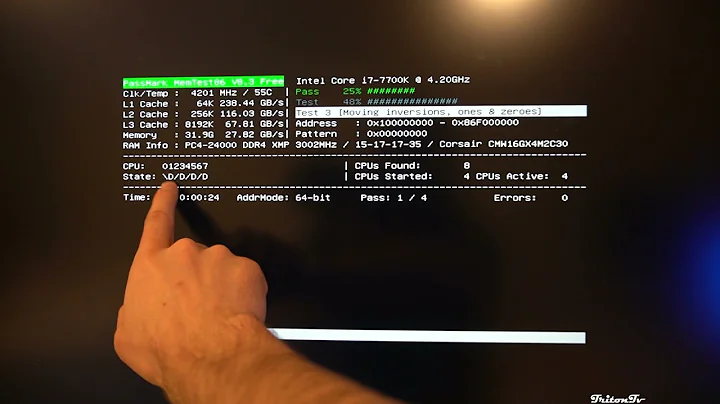I have been told to accept one error with Memtest86+
Solution 1
Straight from the Memtest86 author. I would push them to replace it. There should really be no errors at all.
If you have a relatively small number of failing addresses and only one or two bits in error you can be certain that the errors are valid. Also intermittent errors are without exception valid. Frequently memory vendors question if Memtest86 supports their particular memory type or a chipset. Memtest86 is designed to work with all memory types and all chipsets.
All valid memory errors should be corrected. It is possible that a particular error will never show up in normal operation. However, operating with marginal memory is risky and can result in data loss and even disk corruption. Even if there is no overt indication of problems you cannot assume that your system is unaffected. Sometimes intermittent errors can cause problems that do not show up for a long time. You can be sure that Murphy will get you if you know about a memory error and ignore it.
Solution 2
It looks like only a single bit is being corrupted (i.e. not set to logic 1 when expected) at that address. If you can reproduce the error, the RAM is faulty. Even a reproducable 1-bit error is still an error, and could cause problems when using the computer.
Properly working memory should *never** have any errors, as a computer expects (and is why they crash when you have bad memory, as a safeguard; you can't reliably run a machine with bad memory, as the computer may execute corrupted instructions or provide/store corrupted data).
* over a long enough timespan, it's possible for DRAM bits to get corrupted from external sources like background radiation; the event is usually so rare most computers run Memtest for weeks without error. Also see the Stack Overflow question, "Cosmic Rays: what is the probability they will affect a program?".
Related videos on Youtube
DustByte
Updated on September 18, 2022Comments
-
DustByte over 1 year
Bought a new computer back in August with 4x4 GB RAM. Had problems with the RAM. They sent me four new sticks, which also generated errors. Singled out four sticks (from the eight I now had) that didn't generate any errors. Discovered by coincident a new RAM error last week (this time no BSOD). Contacted the company. According to them there have been issues with a bad stock from last summer so I got two tested 8 GB sticks sent to me. Been running Memtest86+ over the weekend. After 20 hours I got an error (see attached photo). The test has now been running for 37 hours but so far only this one error. I contacted the company where I bought the computer. They wrote back:
I wouldn't worry about hat one fail.
We have had similar situations here whereby it passes numerous times but then fails once. We think it's an issue with memtest, after all memory is faulty or it isn't so you can't really have it pass a few times, fail the next time around and then pass again!
Please trust me on this and continue with the memory we sent you and if your problems continue we'll look at getting it replaced again.
I gather from other forum posts that many people do not accept a single error. What could this single error signify, faulty RAM or a glitch in the MEMTEST program (or other)?
Update: From the helpful comments below I conclude that an occasional (and rare) "random" error could occur and be acceptable, but repeated errors at the same address would indicate malfunction. Memtest has now run for 45 hours and I still have only one error. For everyone's information, I will keep running the test. In less than two days I am going away for a month. I will most likely leave Memtest running. As I do not have a UPS there is a risk that a power outage will ruin the experiment. The computer is a desktop so I cannot bring it with me (which would curiously have exposed it to more cosmic rays as I will be flying ;)).

-
 Dave over 11 years+1; Personally, I think a great question, I'm sorry I can't help with an answer. I updated your question slightly to ensure it isn't off topic!
Dave over 11 years+1; Personally, I think a great question, I'm sorry I can't help with an answer. I updated your question slightly to ensure it isn't off topic! -
uxout over 11 yearsI personally wouldn't sweat one, and only one, failure...non error correcting RAM can occasionally have a problem, it's not perfect. Now, if you can duplicate this at the same address range, then there's something wrong with that.
-
Ramhound over 11 yearsIts pretty simple. The error you posted means your memory is not holding the correct value at that given address
-
DustByte over 11 yearsI cannot tell for sure that it is not something wrong with the computer (say motherboard). Back in August however, the errors seemed to be linked to the RAM (I base this on the results from Memtest86+ when trying many different configurations of the RAM modules in the slots).
-
j-g-faustus over 11 yearsAgree with @Shinrai - if there weren't occasional intermittent glitches with normal RAM, there would be no market for error correcting RAM. Repeated errors at the same address is a different matter, that would indicate a faulty memory cell.
-
Oliver Salzburg over 11 yearsThat one rare error - that's the one BSOD that only happens once a month which no one can figure out. Get the memory replaced.
-
DustByte over 11 years@dangph, the brand is Corsair and this is the model.
-
 J Slick over 11 years@DustByte, Corsair is a well-respected brand.
J Slick over 11 years@DustByte, Corsair is a well-respected brand. -
 J Slick over 11 years@DustByte, you could check to see if there have been any relevant BIOS updates for your motherboard.
J Slick over 11 years@DustByte, you could check to see if there have been any relevant BIOS updates for your motherboard. -
Kaz over 11 yearsYou people do know that one bad bit stops the show, right? I would not use that machine for anything.
-
-
DustByte over 11 yearsSo far no more errors. The test is still running. At this point it is perhaps only hypothetical to ask "what if this is the only single error I get after running the test for one week?"
-
Breakthrough over 11 years@DustByte then I would assume it's fine. It would only be a concern if the same error happened at the same memory location, which would indicate a faulty DRAM cell. Many things can change the error rate of RAM, including background radiation (e.g. from cosmic ray storms or other radiation sources).
-
henry700 over 11 yearsin one instance, Fermilab measured 2.5 "Single Event Upsets" per day over multiple machines w/combined 160 Gbits. They attributed this to background radiation. Altitude matters in this case: Boulder Colorado will see this more often than in Death Valley
-
uxout over 11 yearsThat Stack Overflow question was really insightful - I didn't realize the rate of error due to cosmic radiation was quite that high.
-
j-g-faustus over 11 yearsHe means valid as in "intermittent errors are real errors, not an artifact of Memtest". But that doesn't necessarily translate to faulty RAM. Intermittent RAM errors happen, that's why there is such a thing as error-correcting RAM. Google measured it on their servers: "an average DIMM experiences nearly 4000 correctable errors per year". See also ZDNet




